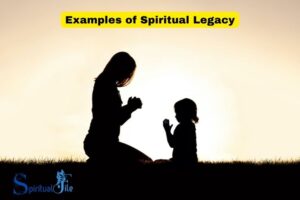Examples of Spiritual Convictions: Direction!
Spiritual convictions are deeply held beliefs that provide purpose, direction, and meaning in life.
Examples of spiritual convictions may include the belief in a higher power, the importance of love and compassion towards others, the pursuit of inner peace and personal growth, and the understanding of mortality and the afterlife.
Spiritual convictions refer to the core beliefs or principles that an individual holds about the nature of existence, the universe, or their place within it.
These beliefs often transcend the physical and empirical, tapping into the realm of the spiritual or metaphysical. They are typically deeply personal and can vary drastically from person to person.
Spiritual convictions can greatly influence a person’s outlook on life and their decisions. They provide a framework for ethical conduct, personal growth, and interpersonal relationships.
Individuals often turn to their spiritual convictions for comfort and guidance during challenging times.
Belief in a higher power or divine entity can foster a sense of hope and resilience, while the commitment to love and compassion inspires empathy and kindness towards others.
10 Spiritual Convictions Examples
| Spiritual Convictions | Brief Description |
|---|---|
| Monotheism | The belief in a single, universal, all-encompassing deity. |
| Polytheism | The belief in multiple gods, often seen in ancient Greek and Roman religions. |
| Pantheism | The belief that the divine pervades and interpenetrates every part of the universe and also extends beyond space and time. |
| Animism | The belief that objects, places, and creatures all possess a distinct spiritual essence. |
| Atheism | The absence of belief in the existence of deities. |
| Agnosticism | The view that the existence of God, of the divine or the supernatural is unknown or unknowable. |
| Deism | The belief that a higher being exists, but does not interfere in the physical world. |
| Humanism | An outlook or system of thought attaching prime importance to human rather than divine or supernatural matters. |
| Spiritualism | The belief that spirits of the dead exist and have both the ability and the inclination to communicate with the living. |
| Shamanism | The practice that involves a practitioner reaching altered states of consciousness to interact with the spirit world. |
Key Takeaway

Five Facts About: Examples of Spiritual Convictions
Understanding Spiritual Convictions
Understanding spiritual convictions can be achieved by examining various examples. These examples can range from religious beliefs to personal experiences, providing insight into the diverse nature of spiritual convictions.
Spiritual convictions play an essential role in shaping our beliefs, values, and overall outlook on life. They provide a sense of purpose, guidance, and a deeper connection to something greater than ourselves.
Understanding spiritual convictions goes beyond mere beliefs and allows us to explore the depth and meaning of our spiritual experiences.
In this section, we will delve into the importance of spiritual convictions and how they differ from beliefs.
Importance Of Spiritual Convictions:
- Spiritual convictions provide a moral compass: They help individuals distinguish between right and wrong, helping guide their actions and decision-making process.
- They offer a sense of meaning and purpose: Spiritual convictions give individuals a broader perspective on life, helping them find a sense of purpose and fulfillment beyond materialistic pursuits.
- They provide comfort and solace during difficult times: Spiritual convictions offer hope, strength, and resilience to individuals facing adversity, providing them with a source of solace and peace.
- They promote personal growth and self-awareness: By exploring their spiritual convictions, individuals can deepen their self-understanding and promote personal growth, leading to a more balanced and fulfilling life.
- They foster a sense of connection and belonging: Spiritual convictions can create a sense of community and belonging, allowing individuals to connect with like-minded individuals who share similar beliefs.
How Spiritual Convictions Differ From Beliefs:
- Spiritual convictions are deeply held principles: Unlike beliefs, which can change or adapt over time, spiritual convictions are fundamental truths that individuals hold onto firmly.
- They stem from personal experiences: While beliefs can be influenced by external factors such as culture or upbringing, spiritual convictions arise from deeply felt personal experiences or moments of transcendence.
- Spiritual convictions involve a strong emotional connection: Unlike beliefs that can be intellectual or rational in nature, spiritual convictions often evoke strong emotions and provide individuals with a sense of spiritual fulfillment.
- They transcend religion or specific doctrines: Spiritual convictions are not limited to any particular religion or set of teachings but can be unique to the individual’s spiritual journey.
- They guide personal transformation: While beliefs offer a framework of understanding, spiritual convictions propel individuals towards personal transformation and a deeper connection to their inner selves and the divine.
Understanding the importance and nuances of spiritual convictions enriches our spiritual journey and contributes to personal growth. By embracing and exploring our spiritual convictions, we can cultivate a deeper connection with ourselves, others, and the infinite possibilities of existence.
Personal Spiritual Convictions
Personal spiritual convictions can manifest in various ways, such as practicing meditation for inner peace or following a particular religious faith. These convictions provide individuals with a sense of purpose and guide them in making life decisions aligned with their spiritual beliefs.
Exploring Individual Journeys:
- Each person’s spiritual journey is unique and deeply personal.
- It is a quest to find meaning, purpose, and connection beyond the physical realm.
- Spiritual beliefs are shaped by a combination of personal experiences, upbringing, cultural influences, and introspection.
- Exploring individual journeys involves delving into one’s innermost thoughts, feelings, and beliefs.
- It is a lifelong process of self-discovery and growth, leading to the development of personal spiritual convictions.
Nurturing Personal Spiritual Convictions:
- Nurturing personal spiritual convictions requires an open mind and a willingness to explore different perspectives.
- It involves seeking knowledge, studying sacred texts, and engaging in spiritual practices such as prayer, meditation, or rituals.
- Building a strong foundation involves connecting with like-minded individuals or joining spiritual communities that provide support and guidance.
- Regular reflection and introspection help individuals deepen their understanding of their own spiritual beliefs.
- Nurturing personal spiritual convictions also involves being adaptable and open to revisiting and revising beliefs as one’s journey progresses.
Examples Of Spiritual Convictions In Different Religions
Discover the varied spiritual convictions across different religions, from the belief in karma in hinduism to the importance of faith in christianity. Gain insights into the diverse ways individuals find spiritual meaning in their lives.
Buddhism:
Core spiritual convictions:
- The belief in the four noble truths, which state that suffering exists, suffering arises from attachment and desire, suffering can be overcome through the cessation of attachment, and the eightfold path leads to the cessation of suffering.
- The belief in the concept of impermanence, understanding that all things are transient and subject to change.
- The belief in the interdependence of all beings and the understanding that actions have consequences.
Examples from buddhist teachings:
- The teachings of gautama buddha emphasize the practice of mindfulness, meditation, and compassion to achieve enlightenment and liberation from the cycle of rebirth.
- The eightfold path, which includes right view, right intention, right speech, right action, right livelihood, right effort, right mindfulness, and right concentration, is a guiding principle for moral and ethical conduct.
Christianity:
Key spiritual convictions:
- The belief in the holy trinity, consisting of god the father, jesus christ the son, and the holy spirit.
- The belief in the divinity of jesus christ and his role as the savior and redeemer of humanity.
- The belief in the importance of love, forgiveness, and the commandment to love one’s neighbor as oneself.
Examples from the bible:
- The ten commandments, given to moses on mount sinai, are a set of moral principles and guidelines for righteous living.
- The teachings of jesus christ, found in the new testament, emphasize the values of humility, compassion, forgiveness, and selflessness.
Hinduism:
Fundamental spiritual convictions:
- The belief in karma, the law of cause and effect, which states that one’s actions in this life will have consequences in future lives.
- The belief in dharma, the moral and ethical duties and responsibilities that individuals must fulfill.
- The belief in moksha, the liberation from the cycle of birth, death, and rebirth.
Examples from hindu scriptures:
- The bhagavad gita, a sacred text, teaches the importance of fulfilling one’s duty (dharma) without attachment to the results.
- The upanishads emphasize the search for self-realization and the understanding of the ultimate reality (brahman).
Islam:
Essential spiritual convictions:
- The belief in the oneness of allah (god) and that muhammad is the final prophet.
- The belief in the five pillars of islam: The declaration of faith (shahada), prayer (salah), giving of alms (zakat), fasting during ramadan (sawm), and pilgrimage to mecca (hajj).
- The belief in the divine revelation of the quran as the word of allah.
Examples from the quran:
- The quran provides guidance on moral and ethical issues and encourages believers to strive for righteousness, justice, and compassion.
- The hadith, the sayings and actions of prophet muhammad, offer practical examples of how to practice the teachings of islam.
Judaism:
Central spiritual convictions:
- The belief in the oneness of god and the covenant between god and the jewish people.
- The belief in the importance of observing and fulfilling the commandments (mitzvot) found in the torah.
- The belief in the concept of tikkun olam, the responsibility to repair and improve the world.
Examples from jewish teachings:
- The ten commandments, given by god to moses, outline the foundational principles of jewish ethics and morality.
- The teachings of jewish scholars and rabbis provide guidance on various aspects of life, including relationships, social justice, and the pursuit of knowledge.
In different religions, spiritual convictions play a vital role in shaping the beliefs and practices of their followers.
Whether it is buddhism, christianity, hinduism, islam, or judaism, these convictions offer guidance on morality, ethics, and the pursuit of spiritual growth.
By understanding the core principles and examples from their respective teachings and scriptures, individuals can gain insight into the diverse spiritual perspectives found across different religions.
Each religion brings a unique set of convictions that contribute to the spiritual development and understanding of its followers.
Modern Examples Of Spiritual Convictions
Discover modern examples of spiritual convictions that showcase the power of faith in everyday life. These inspiring stories illuminate how individuals have found strength, purpose, and guidance through their unwavering spiritual beliefs.
Environmentalism:
Environmentalism is a modern example of spiritual conviction that emphasizes the interconnectedness between humans and the natural world. It is rooted in the belief that taking care of the environment is not just a practical matter, but a spiritual obligation.
Here are some examples of deep ecological convictions and the actions taken by environmental activists:
Conservation of natural resources: Environmentalists believe in preserving and protecting natural resources, such as clean air and water, for the well-being of present and future generations.
By promoting sustainable practices, they advocate for reducing pollution and waste.
Climate change awareness: Recognizing the urgent need to address global warming, environmental activists strive to raise awareness about climate change and its consequences.
They work towards reducing greenhouse gas emissions and promoting renewable energy sources.
Biodiversity preservation: Environmentalists understand the importance of maintaining biodiversity for the overall health of ecosystems. They promote the protection of endangered species, conservation of habitats, and the restoration of damaged ecosystems.
Social Justice:
Social justice movements are driven by spiritual convictions that focus on fostering equality and fairness in society.
Here are some examples of social justice convictions and the actions taken by those advocating for equality:
Gender and racial equality: Social justice activists fight against gender and racial discrimination, striving for equal opportunities and rights for all individuals irrespective of their gender or race.
They work to challenge stereotypes, promote diversity, and ensure fair treatment.
Economic justice: Advocates for social justice believe in addressing economic disparities and ensuring fair distribution of resources. They work towards reducing poverty, improving access to education and healthcare, and advocating for fair wages.
Lgbtq+ rights: Social justice movements actively support the rights and acceptance of the lgbtq+ community. They push for legal protections, equal marriage rights, and the elimination of discrimination based on sexual orientation or gender identity.
Nonviolence:
Nonviolence is a spiritual conviction centered around achieving peace and harmony through nonviolent means.
Here are some examples of nonviolent convictions and the actions taken by peace activists:
- Peaceful protests: Nonviolent activists engage in peaceful protests as a means to raise awareness and advocate for social or environmental change. Through acts of civil disobedience, they seek to garner attention without resorting to violence.
- Conflict resolution: Peace activists focus on mediating conflicts and promoting dialogue as a way to resolve disputes. They work towards building bridges and fostering understanding between conflicting parties, believing in the power of compassion and empathy.
- Pacifism: At the core of nonviolence is the belief that war and violence are not the solutions to conflicts. Pacifists advocate for disarmament, rejecting the use of force and seeking alternative paths to peace.
By examining these modern examples of spiritual convictions, we can gain insight into the diverse ways in which individuals are driven by their beliefs to bring about positive change in the world.
Whether through environmentalism, social justice, or nonviolence, these convictions demonstrate the profound impact spirituality can have on shaping society for the better.
The Role Of Spiritual Convictions In Daily Life
Throughout daily life, various examples of spiritual convictions shape our beliefs and actions, providing guidance on moral decisions, fostering a sense of purpose, and offering solace in difficult times.
These deeply-held beliefs influence how we relate to ourselves, others, and the world, affecting our overall well-being and personal growth.
Spiritual convictions play a significant role in shaping our daily lives. They act as guiding principles for decision-making, strengthen personal values and ethics, and provide a sense of purpose.
Let’s explore each of these aspects in detail:
Guiding Principles For Decision-Making:
- Spiritual convictions help us make decisions by aligning our choices with our core beliefs and values.
- They provide a moral compass that helps us navigate through life’s challenges and dilemmas.
- By following our spiritual convictions, we can make decisions that prioritize integrity and compassion.
- Spiritual convictions guide us towards actions that contribute positively to our well-being and the welfare of others.
Strengthening Personal Values And Ethics:
- Our spiritual convictions provide a framework for developing and strengthening our personal values and ethics.
- They define what we consider to be right and wrong, and guide our behaviors and interactions with others.
- By following our spiritual convictions, we can cultivate virtues such as honesty, kindness, and forgiveness.
- They inspire us to live in alignment with our highest ideals and aspire to be the best version of ourselves.
Providing A Sense Of Purpose:
- Spiritual convictions give us a sense of meaning and purpose in life.
- They connect us to something greater than ourselves, whether it’s a higher power or a deeper understanding of the universe.
- By living in harmony with our spiritual convictions, we can find fulfillment and satisfaction in our daily lives.
- They provide a guiding light that helps us navigate life’s ups and downs, giving us hope and resilience in challenging times.
Spiritual convictions have a profound impact on our daily lives. They serve as guiding principles for decision-making, strengthen our personal values and ethics, and provide a sense of purpose.
By living in alignment with our spiritual convictions, we can lead more meaningful and fulfilling lives.
Developing And Nurturing Spiritual Convictions
Developing and nurturing spiritual convictions involves embracing values like compassion, gratitude, and mindfulness. These spiritual convictions manifest in acts of kindness, self-reflection, and seeking inner peace.
Spiritual convictions are deeply held beliefs and principles that guide individuals in their spiritual journey.
Developing and nurturing these convictions requires self-reflection, seeking guidance from spiritual leaders, and finding ways to deepen our connection with our spirituality.
Here are some effective ways to cultivate and strengthen your spiritual convictions:
Cultivating Self-Reflection And Introspection:
- Take time for introspection: Set aside regular moments of solitude to reflect on your beliefs and values. Consider the experiences, events, and encounters that have shaped your spiritual journey.
- Journaling: Write down your thoughts, feelings, and insights about your spirituality. Journaling allows you to explore and express your inner thoughts and emotions, aiding in the development of spiritual convictions.
- Meditation and mindfulness: Engage in practices such as meditation or mindfulness to quiet the mind, focus on the present moment, and connect with your inner self. These practices can deepen your understanding of your spiritual values.
Seeking Guidance From Spiritual Leaders:
- Find a mentor: Identify someone experienced in spiritual matters who can guide and support you on your journey. Seek their wisdom, ask questions, and learn from their insights and experiences.
- Attend spiritual retreats or workshops: Participate in gatherings and events where you can learn from spiritual leaders and connect with like-minded individuals. These opportunities provide a supportive environment for nurturing your spiritual convictions.
- Join a spiritual community: Engage with a community that shares your beliefs and values. Regularly attend spiritual gatherings, discussions, or study groups to gain insights and perspectives from others on the same journey.
Deepening Your Connection With Spirituality:
- Prayer and contemplation: Dedicate time for prayer or contemplation, allowing you to connect with the divine and gain spiritual clarity. These practices can deepen your understanding of your spiritual convictions and strengthen your relationship with spirituality.
- Engage in acts of service: Serving others can be a powerful way to connect with your spirituality. Volunteer or engage in acts of kindness, compassion, or charity to align your actions with your spiritual beliefs.
- Explore different spiritual practices: Expand your horizons by exploring different spiritual practices, rituals, or traditions. By exposing yourself to diverse perspectives, you can gain a more comprehensive understanding of your own spiritual convictions.
By actively engaging in self-reflection, seeking guidance from spiritual leaders, and deepening your connection with spirituality, you can develop and nurture your spiritual convictions.
These practices will enable you to lead a more meaningful and fulfilling spiritual life while staying aligned with your core beliefs.
Challenges And Conflicts Related To Spiritual Convictions
Examples of spiritual convictions often bring various challenges and conflicts to individuals. These conflicts arise from differences in beliefs, values, and understanding, testing one’s ability to navigate and find harmony within themselves and with others.
Whether it’s conflicting interpretations of religious texts or differing views on moral principles, the journey of spiritual convictions entails grappling with these complexities.
When it comes to embracing spiritual convictions, challenges and conflicts are bound to arise, especially when interacting with individuals who hold differing perspectives.
These situations can test one’s beliefs, require a delicate approach, and necessitate effective communication and conflict resolution skills.
Here are some key strategies to consider when faced with challenges and conflicts related to spiritual convictions:
Dealing With Differing Perspectives
- Listening with empathy: Take the time to truly listen to the perspectives of others without judgment or interruption. This demonstrates respect and fosters open dialogue.
- Respecting diversity: Recognize that diversity in spiritual beliefs exists and is a natural part of society. Accepting and respecting these differences promotes harmony and understanding.
- Finding common ground: Seek areas of agreement and shared experiences to help bridge the gap between contrasting perspectives. Identifying common values or goals can create a foundation for meaningful conversations.
- Engaging in respectful conversations: Approach discussions with an open mind and a willingness to learn from others. Share your beliefs and experiences in a respectful manner, allowing for a healthy exchange of ideas.
- Seeking knowledge: Educate yourself about different spiritual beliefs and practices. Learning about other perspectives can foster empathy and understanding, enabling more constructive conversations.
Resolving Conflicts With Others
- Communication and active listening: Clearly articulate your concerns and feelings, while making an effort to understand the other person’s perspective. Active listening is crucial for effective conflict resolution.
- Finding a middle ground: Look for compromise or alternative solutions that can satisfy both parties’ needs. This may involve finding common values or exploring creative options.
- Respecting boundaries: Understand and respect personal boundaries, being mindful not to impose one’s beliefs on others. Each individual has the right to their own spiritual journey.
- Seeking mediation: In more complex conflicts, consider involving a neutral third party to facilitate constructive dialogue and help find a resolution that is acceptable to everyone involved.
- Forgiveness and compassion: Foster an attitude of forgiveness and compassion towards others, recognizing that we are all fallible and capable of growth. This can promote healing and reconciliation.
Remember, conflicts related to spiritual convictions can be opportunities for personal growth and a deeper understanding of oneself and others.
By navigating these challenges with respect, empathy, and open-mindedness, we can foster harmonious relationships and a greater sense of unity within diverse communities.
FAQ On Examples Of Spiritual Convictions
What Are Some Examples Of Convictions?
Examples of convictions include criminal offenses such as theft, assault, murder, or drug trafficking. Other convictions may be related to fraud, embezzlement, or driving under the influence.
Convictions can also result from non-criminal cases, like conviction for contempt of court or civil cases involving breach of contract.
Convictions are legally binding and can lead to penalties such as imprisonment, fines, probation, or community service.
They can have long-term consequences, including restrictions on employment opportunities, loss of certain rights, and damage to personal reputation.
It is important to note that each conviction depends on the jurisdiction and the specific circumstances of the case.
What Is A Conviction In Spirituality?
Conviction in spirituality refers to a strong belief or firm faith in certain spiritual principles, teachings, or practices. It is a deep personal conviction that shapes and guides an individual’s spiritual journey.
Convictions in spirituality can vary widely, as they are influenced by personal experiences, religious or philosophical beliefs, and personal interpretations of spiritual teachings.
Such convictions are deeply held and often determine one’s attitudes, values, and behaviors in relation to the spiritual realm.
They may involve beliefs about the existence and nature of a higher power, the purpose and meaning of life, the interconnectedness of all beings, or the pursuit of enlightenment or inner peace.
Convictions in spirituality provide individuals with a sense of purpose, motivation, and inner strength as they navigate their spiritual path.
What Are Examples Of Religious Convictions?
Religious convictions are personal beliefs related to worship and faith. Examples include christianity, islam, hinduism, buddhism, and judaism.
These convictions involve the belief in a higher power and typically include specific rituals, practices, and moral codes. Followers of christianity, for instance, believe in the teachings of jesus christ and the holy bible.
Islam followers believe in allah and follow the teachings of the quran. Hinduism is characterized by the belief in multiple deities and the concept of reincarnation.
Buddhism emphasizes achieving enlightenment through meditation and eliminating suffering. Judaism revolves around the worship of one god and following the torah.
These examples highlight the diversity and variety of religious convictions around the world.
What Is A Personal Religious Conviction?
A personal religious conviction refers to an individual’s deeply held belief or faith in a particular religion. It is a strong conviction that guides their thoughts, actions, and way of life.
Personal religious convictions are unique to each person and may vary across different religions and denominations.
These convictions are often shaped by personal experiences, teachings, and interpretations of religious texts.
They provide a foundation for moral values, ethical conduct, and spiritual growth. Personal religious convictions can play a significant role in shaping an individual’s identity and worldview.
They provide a sense of purpose, meaning, and guidance, helping individuals make decisions and navigate life’s challenges.
What Are Some Common Spiritual Convictions?
Some common spiritual convictions include the belief in a higher power, the importance of faith and prayer, and the pursuit of inner peace and enlightenment.
Conclusion
The examples of spiritual convictions discussed in this blog post highlight the diverse ways in which individuals find meaning and purpose in their lives.
From religious beliefs that guide moral and ethical decisions to personal experiences that cultivate a deep sense of connection to something greater, spirituality encompasses a wide range of perspectives and practices.
Whether it is the unwavering faith of a devoted believer, the transformative power of meditation and mindfulness, or the profound insights gained through nature and artistic expression, spirituality serves as a guiding force for many individuals.
These examples demonstrate that spiritual convictions can not only provide individuals with a sense of inner peace and clarity, but also inspire acts of kindness, compassion, and social justice.
Ultimately, understanding and respecting the various manifestations of spiritual convictions can foster a sense of unity and empathy, allowing us to appreciate the richness and diversity of human experience.






